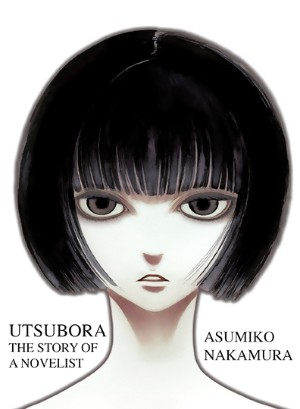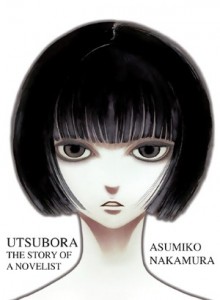By Asumiko Nakamura. Released in Japan as two separate volumes by Ohta Shuppan, serialized in the magazine Manga Erotics F. Released in North America by Vertical.
I didn’t know a whole lot about this series going into it, except that it had striking cover art, and the premise seemed to promise a whodunnit sort of thing. As it turns out, the death at the start of the book is more of a catalyst than a mystery. Instead, it’s the story of several really broken people, and watching them all move through life, desperately trying to find the purpose they lack. And trust me, that’s a lot more riveting than trying to figure out how someone really died.
The plot of the manga involves a well-known writer who has apparently begun a new series in a monthly magazine called ‘Utsubora’ – an archaic Japanese word that can mean ‘hollow space’. The fictional story and the manga both are inhabited by people who define that word, be it the writer himself, the mysterious girl who seemed to be his muse, his exasperated editor, or the niece who is seemingly the most normal girl here. One of the things I really liked about the manga is the way that Nakamura makes you shift sympathies as you read and understand more – I really empathized with Tsuji, the young editor, at the start, and then less and less as the story went on and we saw how far he’d go regarding his crush. Likewise, Mizorogi started off as a stoic creep, but gradually I felt deep pity and empathy for him.
Despite what the title may imply, not every series that runs in Manga Erotics F has to have sex in it. This one does, though, and we see quite a few scenes of lovemaking. The interesting thing is that they’re all presented very differently depending on who is present. Mizorogi’s psychological issues mean that sex with him is very different from sex with someone like Tsuji, a fact that is pointed out immediately by the girl who’s been with both of them. (It also ties in to his issues with being able to write, and using “Fujino” for that.) And a later scene showing Tsuji and a desperate female author who’s in lust with him seems far dirtier than the other scenes, less loving and more passionate and quick.
I haven’t talked much about the two girls on the front and back covers, even thought they are very much the focus of this work. Indeed, for a while I wasn’t quite sure what was going on with them at all. The mystery set up at the beginning was less about the death and more about what happened before, and how much we, as a reader, could trust what’s presented to us. In the end, though, I’m left with an almost aching sadness as I look back on what happened with Aki Fujino, Sakura Miki and Fujiko Akiyama, and it’s her character that conveys the meaning of the title the most. At the start, and at the end, she stands stoic before us, but in between those times the raw emotion is almost too much to bear.
Utsubora is a book, I think, that has to be felt almost as much as it has to be read. Its examination of a writer’s life, and the people that surround that life, is tangible and heartbreaking. There’s a lot of stuff I wasn’t even able to cover here, simply as I didn’t want to spoil too much about this book, which is highly unusual for me. Seek this out, it’s one of the best titles I’ve read this year.

